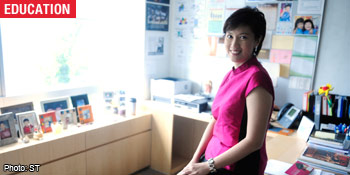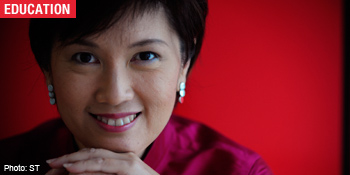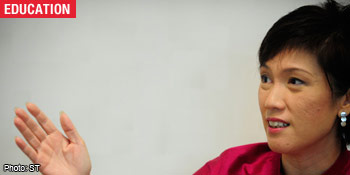
MRS Josephine Teo entered politics in May 2006, shortly after joining the labour movement as a human resource (HR) director in October 2005.
She was seconded to the National Trades Union Congress from the Agency for Science, Technology and Research (A*Star), where she was HR director.
She joined A*Star in 2002, after 10 years with the Economic Development Board (EDB), where her last job was head of HR.
In 1996 and 1997, she and her husband, Mr Teo Eng Cheong, worked in Suzhou, with the China-Singapore Industrial Park Development, now known as Suzhou Industrial Park.
Mrs Teo, 41, was seconded from the EDB to the industrial park project, while her 43-year-old husband was then working with the EDB.

He is now the chief executive of government agency Competition Commission of Singapore.
The couple met while in junior college, and they now have three children: Simon, 11, and twin girls Jaime and Nicole, nine.
Mrs Teo, who is bilingual, is also conversant in such dialects as Cantonese, Hakka and Hokkien, which she picked up while working in the family's shoe shop in Joo Chiat.
She did her primary schooling at St Hilda's Primary and spent her secondary school days at Dunman High before going to Raffles Junior College.
In 1991, she graduated with a Second Class (Upper) honours degree in economics from the National University of Singapore.
The same year, she got an EDB scholarship to do a master's degree at the London School of Economics.

By Kor Kian Beng, Political Correspondent
Balancing act
MP JOSEPHINE Teo has an intriguing way of describing her new role as the education watchdog in Parliament.
Think of me as an irritant and an encourager at the same time, says the 41-year-old.
It is a balancing act she believes will ensure the education sector does not stand still and bask in the glory of its success.
'We've got to poke, put pressure to create a little bit of discomfort in order to get across that things have to move.'
But, she adds: 'We must also speak up to support new ideas for improving the education landscape, because there's no guarantee that they will work. So we must encourage such initiative.'
In the same way, she wants Singapore schools to seek the fine balance between the race for top grades and the need to inculcate in their students the 3Rs: rootedness, roundedness and resilience.
The traditional 3Rs - reading, writing and arithmetic - are no longer enough in this rapidly changing world, she says.
'Lines are not drawn so clearly in this world that we're entering. An engineer also needs to have a sense of the aesthetics because what's needed for the future is design for quality living.'
She asks rhetorically: 'So can you just train people who get the logic of it but don't have an appreciation of the aesthetics?'
Much of her ambitions for the education system here is influenced by her own school experiences, especially the four years she spent at Dunman High, a Special Assistance Plan school where the emphasis is strong on Chinese traditions, language and culture.
'In turn, we imbibed the Chinese culture and values,' she says.
Reciting a mantra subscribed to by most Chinese schools - de zhi ti qun mei - she plans to make it her mission to spread the word to all schools, saying it represents the key pillars of education.
In translation, the characters refer to morals, intellect, physical body, team spirit and aesthetics.
It is a holistic approach to education that she has made a top focus of the government parliamentary committee (GPC) she was elected to chair in May.
The MP for Bishan-Toa Payoh GRC has been a member of the GPC since she entered politics in the May 2006 General Election. The mother of three is also quick to draw on the experiences of her children, a son aged 11 and twin girls aged nine, to push for change. But her four years at Dunman High appear to have made the strongest impact.
'I think more than giving me a foundation in language and culture, it gave me a foundation in values,' she says.
Sports was also emphasised. A member of the school's basketball team, she recalls that not a day went by 'that I didn't play basketball'.
'So the ti part is quite strong. Qun, I suppose too because in sports, you are part of a team.'
But these days, she laments, her children, as well as students she talks to, say Physical Education (PE) or art classes are often cancelled for remedial lessons in say, Mathematics or English.
'This is all rather disturbing to me. Art and PE time ought to be sacrosanct,' she says.
Special-needs students
HOWEVER, Singapore's 'exceedingly successful' education system is not lost on her.
Pointing to the nation's investment in the generation of the future, she notes it is second only to defence.
Education spending forms 3.5 per cent of Singapore's gross domestic product while defence spending is up to 6 per cent.
In this year's Budget, the Government has set aside $8.7 billion for education.
Although funds for special-needs students have been rising, Mrs Teo wants the Ministry of Education (MOE) to look at more ways to heighten the sense of inclusiveness in schools among such students and their families.
Her concern stems from a recent encounter with the father of a hearing-impaired pupil at her Meet-the-People Session in Toa Payoh East ward.
The resident, a man in his 40s, was upset that his hearing-impaired child, in Primary 5 at a special-needs school, was not eligible for the Government's Edusave Awards for Achievement.
The cash award is given to students from Primary 4 and upwards for their achievements in co-curricular activities and contribution to community service over a one-year period. But it is not open to students in a special-needs school, a rule the father wanted the MOE to relax for his child on a case-by-case basis.
Mrs Teo, who wrote to the MOE on behalf of the father, argues that the case is not about money because there is enough help from the Government.
These students are entitled to the Edusave Fund and Grant, which the schools can use for common enrichment programmes or to buy more resources.
But, she says: 'The bigger issue is how we can make the special-needs students and their families feel like they belong in an inclusive society, starting at the school level.'
Another key priority for Mrs Teo is to enhance the image and professional status of early childhood teachers.
One way is for the Government to provide training for them, the same way it trains teachers for national schools, she says. This would, in turn, boost salaries and make a career in early childhood education an attractive option for young Singaporeans.
'The overall impact is better quality education for our very young,' she adds.
Another measure she plans to push for is the establishment of a framework, designed along the lines of the Workforce Skills Qualifications (WSQ) scheme, that will set the standard desired for the common skills these educators need to possess.
Raising the quality of early childhood education is a topic close to her heart. Every year, she would call for improvement during the Budget debate on education.
Her keen interest stems partly from her frustration when she was seeking a place to enrol her children. She needed information to assess the quality of early childhood centres but none was available.
Insights of a mother
MRS TEO has three children: Simon, 11, and twin girls Jaime and Nicole, nine. They are pupils of St Hilda's Primary, her alma mater. Reflecting on their future, she confesses that her biggest fear is that the success, safety and comfort of post-independent Singapore will lull them into complacency and a false sense of security.
'The more comfort you give them, the more you must ask yourself, whether they will become so comfortable they bu neng chi ku (Mandarin for 'unable to take hardship').'
'This is a dilemma when thinking about the education of our young - how to give them the chance to fail and rebound, build their resilience and create a winner's spirit in them.'
So, she does not overreact when her children bring home lousy grades, preferring instead to guide them in figuring out how to overcome the setback.
'Also, I want them to realise that grades are not the be-all and end-all.'
Her son recently scored poorly in a Chinese test, she recounts.
'I asked him what he thought of his results. He said it showed he needed to work harder. Hearing him say that was good enough for me.'
Like a proud mother, she could not resist pointing out their love for art and music, the sense of aesthetics she believes makes for a more rounded development.
Her son is especially keen on comics as well. What if he decides to skip university to be a comic book artist?
She says, after a pause: 'I'll ask him if he is prepared to live with the consequences of not having a degree and I'll outline the consequences for him. He must learn to make his own choices.
'In any case, I will not feel stressed about it for a very simple reason. The world today is enlightened enough that if you don't get a degree when you're 20 years old, there's no reason you cannot get it at 30.'

The motivator & converter
ONE month after she was elected a government parliamentary committee chairman, Mrs Josephine Teo took over the reins of networking group Business China and became its chief executive.
She replaced Tanjong Pagar GRC MP Sam Tan, who was appointed a parliamentary secretary.
Business China was set up in 2007 by the Singapore Chinese Chamber of Commerce and Industry. It aims to promote bilingualism and biculturalism as well as boost ties between Singapore and China's business communities.
The road ahead can be bumpy, Mrs Teo says, warning that Singapore's edge in bilingualism is narrowing.
The number of non-Chinese worldwide picking up Mandarin and Chinese nationals mastering English is soaring.
About 40 million people outside China are learning Chinese, according to its Confucius Institute, which has centres across the globe.
Its officials estimate the number will jump to 100 million by the end of next year, says Mrs Teo, who was in China recently.
It was her seventh trip to the Asian giant, since her first visit in 1983. Also, in 1996 and 1997, she and her husband lived in Suzhou when they were working with the China-Singapore Industrial Park Development, now called the Suzhou Industrial Park.
Her husband Teo Eng Cheong, 43, who was then with the Economic Development Board, is now the chief executive of the Competition Commission of Singapore, a government agency that promotes a strong competitive culture and environment in the Singapore economy.
Mrs Teo's many visits have convinced her that China's real pace of development is reflected in the way the country's top 1 per cent live.
Their lifestyle is reflected in the fine-dining restaurants with well-stocked wine cellars and impeccable service. 'These are a far cry from the restaurants I saw in my 1983 trip,' she says.
Equally telling of China's rapid development are the plush, refurbished villas she saw in the old French quarter in Shanghai.
She worries that many Singaporeans are oblivious of the economic challenges posed by China's rapid rise because most who travel there on package tours do not encounter this facet of Chinese society.
Therein lies the challenges facing Business China in its work here: motivating Singaporeans to improve their mastery of the language and to discover more about China, plus providing the opportunities for them to see the many faces of China.
Three target groups
IT IS designing programmes and introducing new initiatives with three groups in mind: Business China's individual members; the employees of its corporate members; and students.
The individual
Individual members understand China but want to deepen their knowledge.
For them, a programme is in the works to invite China's eminent thinkers and China experts from across the world to speak on and discuss issues confronting the Asian giant.
These could range from climate change to the economy, says Mrs Teo.
Fresh graduates
These employees of Business China's corporate members will get an opportunity to train in China under a programme that will likely roll out in January next year.
They will work in the China offices of these Singapore-based companies, spending six to 12 months there.
'They will work, live, play in China and get to understand what these Singapore companies are aiming to do in the Chinese market,' says Mrs Teo.
This Young Leaders' Programme was designed in collaboration with International Enterprise Singapore.
The goal is to open the eyes of these new graduates to the opportunities in China and motivate them to take on China assignments.
Young students
The third target - younger Singaporeans, especially students, whom Business China hopes to attract with initiatives like the CLing Web portal.
The joint venture between Singapore Press Holdings' omy.sg and Business China is an interactive website that aims to pique interest in Chinese with such features as quizzes and pop songs.
Says Mrs Teo: 'This is a group we want to cultivate so that when they enter the workforce, they would want to keep in touch with their bicultural side.'
HR officer also can be MOS ????
Sam Tan only promote from Parliamnentary sec to senior Parliamnentary sec ... she jitao go from nothing to MOS???

 However unlike Jo Teo, Lee grins from ear to ear like a Cheshire cat! So happy and grateful!
However unlike Jo Teo, Lee grins from ear to ear like a Cheshire cat! So happy and grateful!